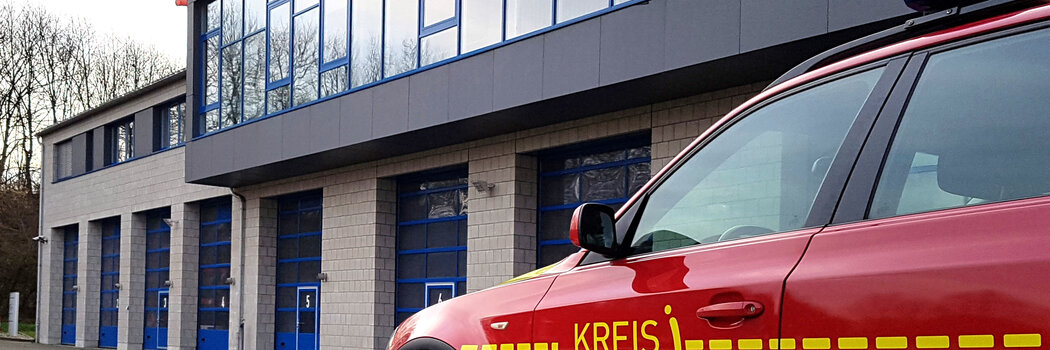As early as kindergarten, our youngest learn that in case of an emergency, they should call the number 112. This emergency number puts citizens in touch with trained specialists in the control centres around the clock. They accept all emergency calls centrally, alert the emergency personnel, and coordinate the process. But what happens if the number is unavailable or if the control centre itself malfunctions? In the district of Unna, the persons responsible have dealt with this topic in detail and have set up a secondary (backup) control centre, which is fully operational at any time. This is ensured by means of a high-performance coupling of the data centre on the basis of wavelength-division multiplexing. For this purpose, the district of Unna relies on the Optical Transport Platform MSP 1000 of MICROSENS GmbH & Co. KG.

Redundancy that saves lives: The control centre of the district of Unna opts for wavelength-division multiplexing
Statutorily regulated redundancy
Since December 2015, the new law on Brandschutz, Hilfeleistung und Katastrophenschutz (BHKG; legal regulations on fire protection, general aid and disaster control) has been in force in the county of North Rhine-Westphalia. In §28, this law stipulates that the control centres must be able to perform their tasks even in the event of a disaster. The administration of the county operating the control centre for fire prevention and rescue services has been dealing with this topic for a longer period of time already. At the latest when the main distribution switch of the Telekom in Siegen broke down as a result of a fire and the emergency call number was unavailable for days afterwards, the topic of redundancy moved into the focus of the fire protection services. This event made it clear to the responsible persons that the redundantly planned communication paths are still frequently connected over one central switch. If this switch breaks down, the telecommunications service provider is faced with big challenges. As a result of the damage in Siegen, the district of Unna performed a stress test – and had to find out that here, too, the main connections and substitute paths led over one central node.
Double separation of the buildings
To provide full protection for the 400,000 persons residing in the district of Unna, the local administration implemented a completely redundant and autarkic backup control centre this year. Sebastian Koch, systems administrator and project manager of the local administration of the district of Unna, has been working to achieve this for a long time. He checked systematically, which locations would be appropriate for a backup control centre. He made his find in Lünen. Unlike the previous site of the backup control centre in the former administrative building of the district of Unna just 2 kilometres away, the fire brigade in Lünen, located more than 15 kilometres away, is connected to a different node of the Telekom. This does not only ensure the spatial separation of the facilities, but also the completely separated routing for all emergency calls.
Variously usable Dark Fiber
In addition, the newly built Main Fire Department and Rescue Centre in Lünen offers the appropriate constructional prerequisites. The core component of the backup control centre is the IT infrastructure. Here, Sebastian Koch initially evaluated the option of a leased line between the two sites in order to quickly re-route the emergency calls over this line in the case of disaster. The mirroring of the data on the computer systems of the control centre of the district, however, would not have been possible with this solution. The option permitted the lease of a Dark Fiber, i.e. a fiber optic connection without pre-installed services in combination with competitive wavelength-division multiplexers. The district of Unna followed the advice of the project manager and implemented the connection between the two sites over a Dark Fiber. In terms of the wavelength-division multiplexers, the decision-takers did not have to search far. MICROSENS, located in the neighbouring city of Hamm, is considered to be a pioneer in this field and offers a high-performance and modularly extensible CWDM/DWDM solution with the Optical Transport Platform MSP 1000. MICROSENS was able to successfully emerges as the winner of the invitation to tender.
Full-scale backup at any time
Today, the district of Unna has a reliable, redundant IT infrastructure for the control centre and is well-prepared for the case of an emergency. In the course of the reconstruction measures for the fire department in Lünen, four workplaces were set up which can be used immediately. In addition, there is the option to set up two further workplaces in the neighbouring room in case of an emergency. All emergency calls can be rerouted to the backup control centre at the push of a button. Moreover, the system also detects the absence of a reaction and then automatically reroutes all emergency calls. As a result, all data records are stored and available both in Unna and in Lünen. Thanks to the wavelength-division multiplexer, the Dark Fiber provides both a 10-Gbit Ethernet and two 8-Gbit Fiber Channel connections. All data records stored on the three computers in the control centre in Unna are permanently mirrored to the computers in Lünen, which means that they are operable at any time. Neither an outage of the telephone switch, nor the destruction of the control centre of the district of Unna endangers the functioning of the emergency infrastructure. The members of the control centre of the district can direct and control the operations for fire protection, rescue services, and air ambulance any time from Lünen.
Reliably working infrastructure
Working towards this new infrastructure, the IT experts were able to benefit from the forward planning of the city of Lünen, explains Sebastian Koch: "The project almost failed, since there was no continuous fiber optic trunk that we could have used. Fortunately, the city of Lünen had installed empty conduits, which we were allowed to use for our fiber optic connections, thus permitting the fast installation in the first place." The MICROSENS Optical Transport Platform MSP 1000 could then be commissioned without any problems. The modular system can be adapted to the individual demands of the customers very quickly and can be extended, where required. Moreover, it wins over the user with its reliable operation, which Sebastian Koch already experienced in the scope of other projects: "We have already been using MICROSENS products for data mirroring in the administration of the district. The solution has been working absolutely reliably for a years." This is a decisive criterion for the local administration of Unna and the responsible project manager, because, after all, the safety of the public is concerned.
About MICROSENS
Transmitting information via fiber optic connections offers numerous benefits. MICROSENS GmbH & Co. KG recognised this very early on. As one of the pioneers, the company has developed and produced high-performance communications and transmission systems in Germany since 1993. Individually matched to the demands of diverse usage areas and embedded in comprehensive concepts for individual sectors. But, above all, close to the customer. Technical challenges from customer projects are incorporated directly into product development. This way, IP-based automation solutions are created for modern buildings, cost-efficient network concepts for the office and workspace, robust and fail-safe solutions for industrial environments, optical transport systems future-oriented wide area networks and efficient coupling of sites and computer centres.










